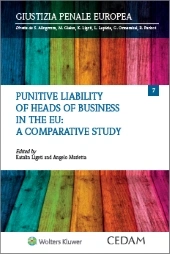Mainstream enforcement practices against white-collar crime in recent years, focusing mostly on the legal entity or the low- and mid-level employees, have been largely unsuccessful. Thepunishment of large corporations for economic offences has indeed been confronted with the “too big to jail” dilemma, and with concerns for the negative spillovers that their collapse may entail for employees, shareholders and consumers. The individual “rogue employee”, on the other hand, may be fungible and easily sacrificed as a scapegoat. The recent debate has therefore brought back to centre-stage the individual liability of senior managers, which is essential to close any “responsibility gap”. But are the ordinary rules of criminal law fit and adequate to hold senior managers accountable? This volume, presenting the findings of a study led by the University of Luxembourg and cofinanced by the European Anti-Fraud Office (OLAF), aims to contribute to this debate with a special focus on the liability of senior managers for the commission of offences against the financial interests of the EU. It compares the criminal liability regimes for senior managers in five Member States (Finland, France, Germany, The Netherlands and Poland) and delivers a set of policy recommendations for establishing the liability of senior managers in compliance with the general principles of criminal law and respect for fundamental rights.


